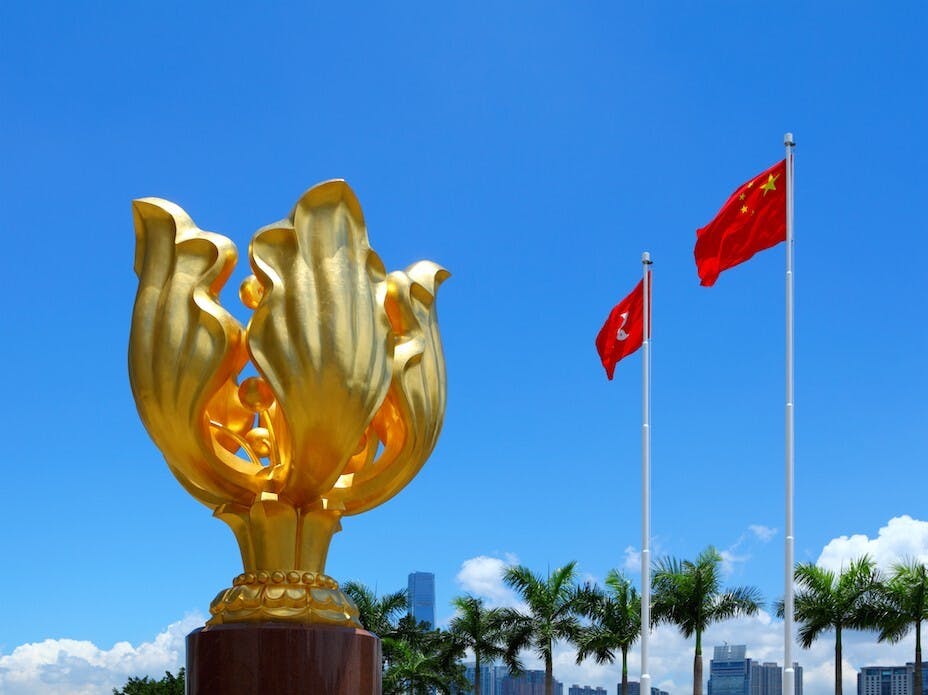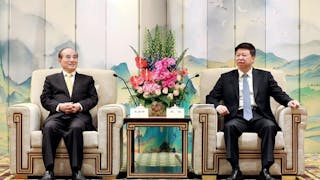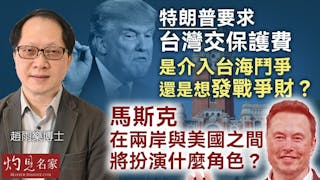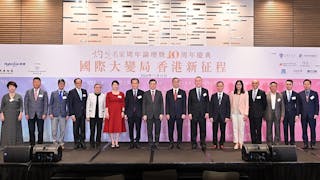從近期香港中學課程改革的內容來看,加強愛國主義教育、國民身份認同和國家安全教育,已成為香港教育改革的重點。
4月中旬,教育局公布了中學11個科目的國家安全教育課程框架。5月26日,教育部進一步公布了餘下四門學科──中國歷史、歷史、生活和社會科、經濟科的國家安全教育課程框架。
歷史課程書本知識、教學活動兼容並蓄
首先,在中國歷史科中,按照國家安全教育的課程改革分初中和高中兩個層次進行。在初中階段,教學改革要實現兩個目標:一、讓學生「了解中國重要歷史事件、人物事跡、民族發展概況及社會文化面貌」,助他們從歷史和文化角度,「了解國家政治安全及文化安全的重要性,提升國家觀念和國民身份認同」 ;二、讓學生「清楚理解國家從被列強侵略,以至英國佔領香港,及後國家克服困難,並恢復對香港行使主權的奮進歷程,從而強化學生對國家民族的使命感和責任心」。
在高中階段,中國歷史科須透過列強入侵、抗日戰爭、改革開放及對外關係等必修課題,「認識近代以來中國面對列強入侵,歷經艱辛,建立獨立自主國家的經歷,幫助學生建立整全的國家觀念」,同時在「有關中國傳統文化發展、文化交流等單元認識中,教導學生欣賞傳統文化的價值,認識各種制度的演進,以至包容不同的宗教,都是維繫國家、民族團結和國家賴以穩定和發展的重要基礎」。
根據課程改革計劃,初中和高中的中國歷史科可進行一些教學活動,例如進行「唐代婦女生活多面睇」活動,透過化唐妝、穿唐服體驗,體會中華文化創新與兼容性。其他跨學科活動包括舉辦「抗日歌曲欣賞會」,了解國民同心抵抗外侮的情形;專訪東江縱隊老戰士,進行口述歷史訪談;考察香港不同地區的抗戰遺址,感受戰爭對人民福祉的禍害,並明白確保國家安全的意義。
其次,初中歷史科不僅要強調「香港自古以來就是中國的領土」的歷史事實,而且要讓學生認識國家如何從被列強侵略和英國佔領香港後,恢復對香港行使主權的歷程;在高中階段,歷史科要讓學生了解,國家在現代化過程中,「國家安全中政治安全及文化安全領域的主要內容,進而認同與維護國家安全的必要性」。同時,配合課程中其他關於世界不同文化和地域的歷史,幫助學生成為「負責任的公民及具備世界視野的中國人」。
第三,初中階段的生活與社會科教學重點,要讓學生「認識國家的現況和發展路向,國家憲法和《基本法》共同構成香港特區憲制基礎,以及中央和香港特區的關係,從而明白國土安全、政治安全、經濟安全、資源安全、軍事安全及海外利益安全的相關內容」。
第四,高中經濟科課程中「貨幣與銀行」和「國際貿易和金融」課題,也包含與經濟安全相關的學習內容。
民間團體復育歷史,官方機構強化操守
很明顯,四科的課程改革旨在提升香港學生的國家認同、愛國主義情懷,以及對香港與中華民族歷史淵源的了解。
最有趣的是,愈來愈多親中團體舉辦活動,以加強香港人的國家認同感。例如,「點新聞」 5 月 26 日舉辦了一場社區論壇,新社聯理事長陳勇主張特區政府應修復和活化二戰期間香港的所有歷史遺跡,包括北區和西貢的抗戰歷史遺跡。此外,他建議博物館可增加抗日歷史展區,並通過使用 5G 技術,增強市民體驗。
北區區議員溫和達建議政府興建相關交通設施,以便市民到沙頭角烏蛟騰抗日英烈紀念碑拜祭先烈。民建聯西貢分區委員會副主席李家良也指出,烏蛟騰抗日英烈紀念碑和西貢烈士紀念碑「反修例」期間遭到塗污破壞,但所有的復修工作都是由民間團體自發進行的。他認為,重視歷史、普及教育,政府責無旁貸。
除了課程改革和遊說政府修復和翻新歷史遺跡外,教育局正考慮制訂官方指引,以加強教師的道德操守。 5月26日,教育局局長楊潤雄回應立法會議員的質詢時,表示1990年的《香港教育專業守則》已經過時,當局將再考慮制訂官方指引,列明教師的操守指標。
楊潤雄還透露,截至2021年4月,教育局共接獲269宗有關教師專業失德的投訴。其中3名教師被取消註冊,另向151名教師發出譴責信、警告信或口頭勸喻,反映在課程改革的過程中,教師專業操守受到前所未有的重視。
綜上所述,對《香港國安法》要求的國家安全教育,出現了三管齊下的策略:一是對中學各科進行課程改革,包括中國歷史和歷史科,尤其強調抗日戰爭的歷史。伴隨教育改革而來是新的學習活動,例如參觀古蹟和鼓勵學生體驗唐朝的生活方式,以加強香港學生的愛國情懷、國家安全意識和民族認同感;二是親中團體和政界人士展開活動,主張修復和活化本地歷史遺跡;三是由立法會議員游說政府修改現有指引,或為教師制定官方指引,以保證國家安全教育。
Chinese Nationalism and Hong Kong’s Curriculum Reform
Judging from the recent content of curriculum reform in Hong Kong’s secondary schools, the enhancement of Chinese nationalism, national identity and national security have become the foci in the education reform of the Hong Kong Special Administrative Region (HKSAR).
In mid-April, the Education Department of the HKSAR government published a detailed lesson plan on how to enhance the ingredient of national security education in eleven subjects in secondary schools.
On May 26, the Education Department publicized further how the rest of the four subjects – Chinese history, history, life and society subject, and economics – can consolidate the content of Chinese nationalism, national identity and national security.
First and foremost, in the subject of Chinese history, curriculum reform in accordance with the national security education is introduced at two levels: junior high and senior high levels. At the junior high level, the reformed pedagogy has to achieve two objectives: (1) let students “comprehensively understand the main events and personalities” in different historical periods, including the need to “understand the importance of political and cultural security and to elevate students’ national identity, mission and responsibility;” and (2) allow students to “clearly understand how the nation overcame difficulties amid foreign invasion, including the British occupation of Hong Kong and China’s diligent process of recovering its sovereignty,” so that students’ sense of national identity, mission and responsibility can be enhanced.
At the senior high level, the Chinese history subject needs to “build up the experiences of national independence and autonomy and to help students construct a full and comprehensive sense of the nation” though compulsory topics like foreign invasion, the anti-Japanese war, the open-door policy and foreign relations. Moreover, students need to “appreciate the value of traditional culture, comprehend the evolution of different systems, tolerate different religions” so that “the important foundation of maintaining national stability and development and the solidarity of ethnic minorities can be laid down.”
These two levels of Chinese history subject will, according to the curriculum reform plan, be accompanied by students’ activities, such as the appreciation of Chinese culture through an understanding of the life of Tang dynasty’s women, the Tang clothing, and the dressing style of people in the Tang dynasty. Other study activities embrace an appreciation of the anti-Japanese war songs, interviews with the old members of the Dongjiang guerillas in South China, oral history interviews with old guerillas, inspections of the anti-Japanese war sites in Hong Kong, and visits to Nanking and the historical sites related to the Opium War and the Treaty of Nanking.
Second, the history subject at the junior high level will have to strengthen students’ sense of national consciousness and identity by not only emphasizing the historical fact that “Hong Kong from the ancient time has been a part of Chinese territory, but also covering how the Chinese nation recovered its sovereignty over Hong Kong after foreign invasion and the British occupation of the territory.” At the senior high level, the history subject needs to let students understand that the Chinese nation in the process of modernization attaches great importance to political, cultural and national security. Students will have to be “responsible citizens” and “Chinese citizens who possess global vision.”
Third, the subject of life and society at the junior high level will need to cover the Chinese nation’s current development and directions, its constitution, and the constitutional foundation between the Hong Kong Basic Law and the Chinese constitution. In this way, students will be expected to understand the content of national, political, economic, resource and military security and the security of the overseas interest of China.
Fourth, the subject of economics at the senior high level will cover the topics of money, banks, international trade and finance and students will be expected to understand the importance of economic security and the people’s livelihood. Students will also be expected to comprehend that Hong Kong coexists with the Chinese nation and that Hong Kong has its duty to maintain China’s economic security, while the nation contributing to the maintenance of Hong Kong’s prosperity and stability.
Obviously, the curriculum reform of the four subjects aims at enhancing the Hong Kong students’ sense of national identity, their nationalistic sentiment, and their understanding of the historical linkages between Hong Kong and the Chinese nation.
A history teacher of the Pui Kiu Secondary School, Muk Ka-chuen, responded to the Education Department’s efforts at strengthening national security education in the subjects of Chinese history and history in the following way: “China’s modern history is like a history of humiliation, and it has a warning function by understanding China’s past history of encountering foreign aggression and the foreign scramble for concessions (Wen Wei Po, May 27, 2021, p. A6).” He added that, by infiltrating the element of national security education into various subjects, students’ national identity and national recognition can be enhanced.
Curriculum reform also necessitates the teachers of various subjects to select officially recommended textbooks and references and the local textbook writers to enhance the content that can contribute to stronger Chinese nationalism, national identity and national security.
Most interestingly, more pro-Beijing organizations have held activities to strengthen the national identity and consciousness of the Hong Kong people. For instance, Dot News organized a forum on May 26 during which a Hong Kong member of the National People’s Congress, Chan Yong, advocated that the Hong Kong government should resume and repair all the historical sites in Hong Kong during the Second World War, including the sites in Sai Kung where renovation and rebuilding work should be conducted. Moreover, these sites can be turned into local museums with the use of 5G technology to enhance the experiences of visitors. A district council member in the Northern district, Wan Wo-tat, suggested that the government should rebuild the traffic facilities of linking urban areas with a statue commemorating the local heroes who fought against the Japanese army in Sha Tau Kok. During the 2019 anti-extradition movement, the statue in Sha Tau Kok was damaged and defaced, but the repair work was done by social groups. As such, the vice-chairman of the Sai Kung Area Committee, Lee Ka-leung, criticized the Hong Kong government for shirking its responsibility of attaching importance to history and repairing historical site (Ta Kung Pao, May 27, 2021, p. A6).
Apart from curriculum reform and organizational activities of lobbying the government to repair and renovate local historical sites, the Education Department is reconsidering the guidelines for teachers to strengthen their professional ethics and conduct. On May 26, Kevin Yeung, the Secretary for Education of the Hong Kong government, responded to the remarks from a fewLegislative Council members, who said the 1990 Guideline of the Hong Kong Education Profession is outdated, and he revealed that his department is reconsidering the possibility of revising the existing guidelines (Wen Wei Po, May 27, 2021, p. A12). Liberal Party member and legislator, Tommy Cheung, requested that the government should review the guideline by adding a new stipulation that teachers should be barred from participating in illegal activities, instigating and organizing students to join such illegal activities, publicizing their political views to students, and showing “radical” views through the Internet. Another legislator, Ronick Chan, suggested that the government should issue an official guideline to combine it with the 1990 Guideline of the Hong Kong Education Profession so that schools and teachers will follow the stipulations more easily.
Yeung also unveiled that, up to April 2021, the Education Department received 269 cases of complaints about teachers’ professional and ethical conduct. Three of the teachers had their teaching licenses revoked, while 151 others were scolded, formally warned, advised or verbally persuaded. Obviously, amid the process of conducting curriculum reform, the professional conduct of teachers has been under much closer scrutiny than ever before.
In conclusion, Hong Kong has envisaged a three-pronged strategy in response to the national security education as required by the national security law. The first strategy is to undertake curriculum reform of various subjects at the secondary schools, including Chinese history and history subjects. The historical development of the anti-Japanese invasion in the Second World War is stressed. These reforms have been accompanied by new study activities, such as visits to historical sites and the mobilization of students to taste the Tang dynasty’s lifestyle, for the sake of enhancing the Chinese nationalism, national security consciousness and national identity of Hong Kong students. The second strategy is characterized by the activities of pro-Beijing organizations and politicians advocating the repair, renovation, recovery and rejuvenation of local historical sites. The third strategy is adopted by local legislators who lobby the government to revise existing guidelines or introduce official guidelines for teachers so that national security education will be entrenched.
原刊於澳門新聞通訊社(MNA)網站,本社獲作者授權轉載。







































